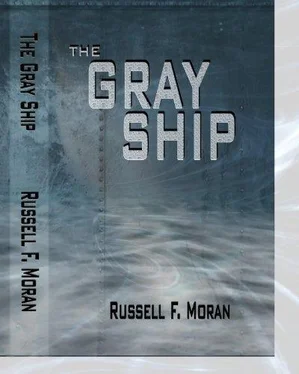“Did you think you were losing your mind?” Ashley asked.
“Captain, I was sure I was losing my mind. As I told you before, you’re the only person I ever told about these stories. The article I wrote for The New York Times about Pearl Harbor was a non-memorable travel piece, with some statistical comparisons to 9/11 thrown in. With all of the books and articles I’ve written, my life, if you’ll pardon the pun, is an open book. But I’ve never talked about my own experiences with time travel, even in my book, Living History .”
“Jack, I want you to keep thinking about those experiences. Yes, I know that you can’t explain what happened, but you’re the only person on this ship who has been through the portal, as you call it. You’re the only guide we’ve got.”
The meeting with Seaman Jack was over, and Ashley tried to sort through the astonishing things she had just heard.
She also realized that she loved the smell of Jack’s after shave lotion.
It was April 11, 1861, one day before the start of the Civil War. As Ashley prepared her list for the next day, a thought struck her. That morning she had met with an over educated, highly accomplished man who held the second lowest rank in the Navy. He was the only one on the ship who could be described as a time travel expert. Because of his experience and his vast knowledge of the subject, Seaman Jack Thurber was one of the most important people on the California . But he was a seaman.
Ashley concluded that military necessity required that Seaman Jack Thurber become an officer. It’s that simple. He’s key to deciphering this strange mess, and that requires a managerial position. He’s the only one on this ship who knows what time travel is all about. He needs to confer with senior staff, to attend meetings in the wardroom, and take on more responsibility than that of pay grade E-3. Because the ship would be at war the following morning at 0430, Ashley would have the legal ability to make what is often called a “battlefield promotion.”
He also needs to spend more time in my office, a lot more, Ashley thought. Promoting Thurber to commissioned officer status had nothing to do with the Navy’s prohibition against fraternizing with enlisted people. That’s completely beside the point, Ashley told herself. She needed to make a command decision.
She rang her Marine aide Corporal Nesbitt. “Arnold, tell Seaman Thurber to report to my office immediately.”
Thurber walked in and came to attention. “Good afternoon, Captain.”
“Good afternoon Seaman Thurber, at ease.” Ashley said with a crisp command voice.
“Seaman, that book that you’re writing, the one about the Navy from a sailor’s perspective — tell me if I’m wrong, but don’t you think that recent events have made it irrelevant, at least for the time being?”
“I have to concur, Captain. I think I have a more interesting book in mind.”
“I thought you’d agree.”
“Then there’s no reason why you should be an enlisted man rather than an officer.”
Jack pointed out what he thought was an obvious problem with the idea that she floated. “Captain, there’s no OCS for me to attend, no officer’s training of any kind in our present circumstances.”
“Seaman Thurber, tomorrow morning at 0430 Fort Sumter will be fired on. We will be at war. In time of war, Navy regulations authorize a commanding officer to make a battlefield promotion for the good of the service. At 0900 tomorrow we will have a special ceremony in the wardroom during which you will be appointed to the rank of Lieutenant Junior Grade. You will skip over the rank of Ensign. I’m going to do this because I need your knowledge and insights on a managerial level.” And I’ll get to see a lot more of you. Stop it girl!
“But Captain, all I know about the Navy is what I learned in boot camp, which is not exactly Annapolis. I don’t see how I’m qualified.”
“Let me ask you a few questions, Seaman Thurber.”
“How do you distinguish bow from stern?”
“The bow is the pointy end.”
“Excellent answer”
“What’s the difference between port and starboard?”
“Starboard’s right, port is left.”
“Perfect.”
“A staircase is called?”
“A ladder.”
“Correct.”
“When you walk to the stern, you walk?”
“Aft”
“Correct again.”
“When you have to pee you go to the?”
“Head.”
“Another correct answer.”
“Seaman Thurber, you have achieved a score of 100. Tomorrow morning you will be Lieutenant Junior Grade Thurber. That is all. Dismissed.”
* * *
At dinner in the wardroom Captain Patterson discussed her meeting with Seaman Jack and announced her plan to appoint him a commissioned officer the next day. She discussed his credentials including his education and publishing achievements as well as his executive experience. She also talked about his knowledge of the phenomenon of time travel. She didn’t mention his blue eyes. Or his after shave lotion.
What happened next shocked not only Captain Patterson but every officer in the room as well. Executive Officer Bradley said, “Captain I cannot agree with your promotion of Seaman Thurber. It will send a very bad message to the crew, especially the sailors who are in the Navy for a career. If they see a guy who they stood next to in the chow line one day who they would have to salute the next, I’m afraid morale could take a big hit. I think this is a reckless course of action.”
The tension in the wardroom was almost painful. All eyes were glued to the table in front of them, as if to avoid looking at the scene of a car accident. Bradley had just crossed a bright line and violated a rule, both written and unwritten: never confront a commanding officer in public.
Navy regulations are written partially based on common sense. An executive officer is expected to voice any disagreement in strict privacy. In public he is expected to observe his role as second in command, not first. His job is to assist the captain in accomplishing the mission, and that includes showing physical and emotional deference to his commanding officer. Military people not only expect the process to work this way, they respect it. It’s the way the system works. Military life is based on a chain of command. If one link in that chain is broken, as the analogy goes, the chain is weakened. When a chain is weakened, a ship can go adrift.
Captain Patterson had to think fast and act decisively. She couldn’t ignore what Bradley said, nor could she ignore the negative dynamic that he created. There was a disturbance in the force and she had to undo it. Bradley had violated a cardinal military rule, and she knew that every officer in the room was on her side, for now.
“Commander,” the Captain said, “we’ve all been under a tremendous amount of stress over the last day, and I’m sure that’s includes you. I’m going to overlook your confrontational statement and scratch it off as an unintended response to the strange situation we’re in.” She then went in for the scoring shot. “Tomorrow at 0900 we will have a ceremony here in the wardroom, and Seaman John Thurber will be sworn in as Lieutenant Junior Grade Thurber. You, Commander Bradley, will perform the ceremony.”
Bradley realized that he was boxed into a corner. He had just been given a direct order. Cross that line, and he may as well pack his bags. He simply said, “Aye aye, Captain.”
One thought passed through the minds of every officer present, except for Bradley, “Go girl!” They realized that Captain Patterson had just righted a major wrong, and they were behind her. Even if Bradley had a good point, and a few thought he did, he violated a sacred military code to make it.
Читать дальше












